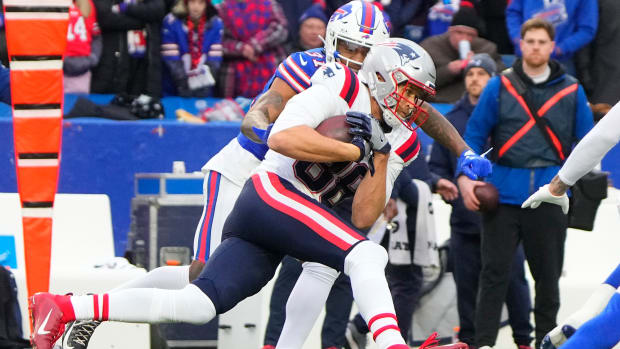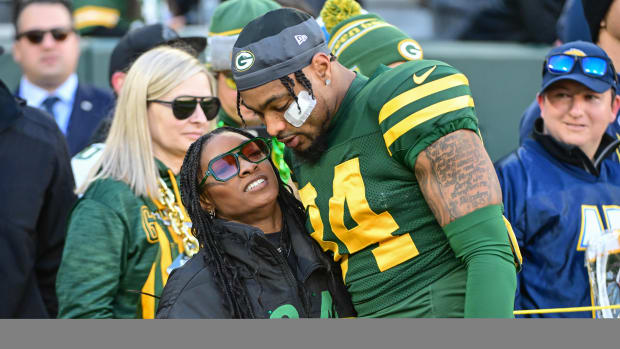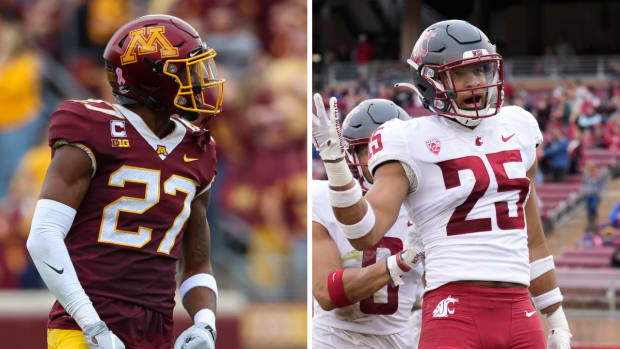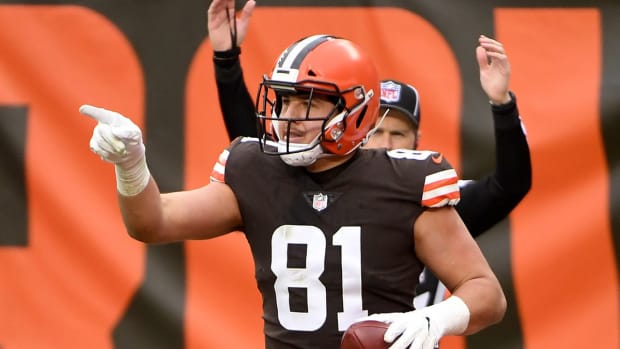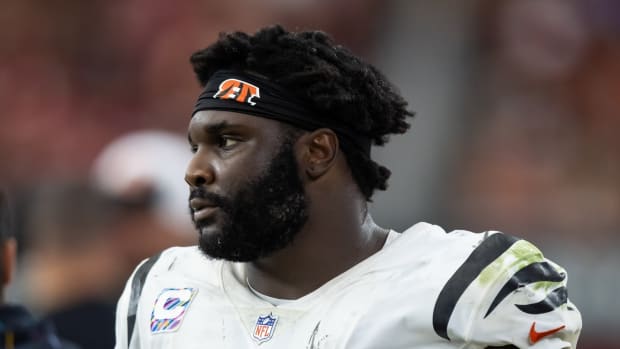Business of Football: How Likely Is Brian Flores’s Lawsuit to Bring About Systemic Change?
On Tuesday afternoon, I was teaching my sports law and business class at Villanova Law School. The subject of the day was the changing nature of college athletics and the sea change due to the Alston case and the advent of name, image and likeness monetization. I lectured for an hour and a half before taking a break, only to have several students approach me about the breaking news of Brian Flores vs. the NFL. That was the end of discussing NIL that day.
Sports law pioneer
Brian Flores filed a class-action lawsuit against three named NFL teams—the Dolphins, Giants and Broncos—as well as the entire NFL. He is represented by the Wigdor law firm, known for representing survivors of Harvey Weinstein’s sexual abuse.
A class-action suit means that more are welcome to join, and my strong sense is that Flores and his lawyers have several other coaches and general manager candidates willing to come on board. The suit was filed on the first day of Black History Month and is rife with racism allegations and terms such as “slavery” and “plantation.” It details the race-norming controversy from the NFL concussion settlement among other allegations of league bias. The charge of systemic racism is a strong one.
A defining feature of plaintiffs in sports law is personal sacrifice to serve the greater good, sacrificing future careers to help those of people who will follow. Examples include Curt Flood, John Mackey and, yes, Colin Kaepernick. We can now add Brian Flores to that list.
Flores likely understands what so many have commented on since his firing: That bringing such a case is potentially terminal to his NFL coaching career. First of all, I am not so sure: never is a very long time. Moreover, with claims that strike at the heart of so many cherished areas for the NFL—systemic racism, competitive balance, integrity, etc.—the real goal is change. The only question is how small or large that change is.
Let’s examine.
Rooney Rule
I remember when this rule was established in the early 2000s; I was working for the Packers, and we were simply told by the league that when interviewing for the head coaching position, a minority applicant must be included. There were no guidelines about the “seriousness” of that interview. The rule was later extended to include the general manager position. (I recently reviewed the history and present status of the rule with Jim Rooney, son of its creator, the late Dan Rooney, on this podcast.)
Over the years, the results have been mixed, but the number of coaches of color was certainly at a low point after the firing of Flores and Texans coach David Culley. And while there have been two Black general managers named in the past week (the Vikings’ Kwesi Adofo-Mensah and the Bears’ Ryan Poles), the headlines continue to blare about a league with 75% of its player population being Black having only one Black head coach (Mike Tomlin).
Flores has shined a huge spotlight on the scenario that the NFL has tried to avoid: sham interviews with minority candidates only to check the box of the rule requirement. Flores claims Broncos management showed up disheveled, hungover and disinterested for his interview a few years ago. And, in damning detail, Flores laid out text messages in which Bill Belichick, thinking he was texting Brian Daboll (who is white), revealed that the Giants had made up their mind on Daboll before interviewing Flores.
The sham interview dilemma
This issue is a tough one. Owners often lock in on a candidate and get singularly focused in their dogged pursuit of that coach. This certainly happened with the Raiders and Jon Gruden a few years ago, and perhaps with the Raiders and Josh McDaniels this time around. It is rumored to have happened a year ago with the Jaguars and Urban Meyer. And, in a reverse situation, I remember talking to former Colts general manager Bill Polian, who told me that when Tampa Bay fired Tony Dungy, he knew that he wanted Dungy and that no other candidate—of any race—would be a serious candidate.
How to solve the problem? Well, my best solution is coming up with sanctions that matter. Teams will do what they do in this regard until it hits them where it hurts: perhaps stiff fines, but more likely forfeiture of draft picks and potential diminished cap spending. Owners all have money to pay fines, but no owner wants to saddle his team with a lost draft pick and/or less money to spend on players.
Of course, no team would ever admit to sham interviews. The Broncos and Giants have already put out PR statements that their processes were fair, and if this case ever went to trial the team decision-makers would list why they chose the candidates that they did over Flores.
For these reasons, violations of the Rooney Rule are hard to prove, even when the evidence seems clear. I think deep down that Flores and his lawyers know this, but it is part of their larger goal to provoke change.
I won’t soon forget one of my students saying in class yesterday, with a resigned look on her face: “Why does Brian Flores have to be the one to change the NFL? Why can’t they just do the right thing?”
The Dolphins
There are two charges against Flores’s former team that strike at the heart of the league’s rules on integrity, competitive balance and tampering.
First, Flores states that in the winter of 2020, he was told by owner Stephen Ross to meet at a yacht for a purportedly impromptu meeting with a prominent quarterback. While this is salacious, the timing will be key. Did “winter of 2020” mean after the season but before the official start of free agency? Or perhaps after the given player had exercised an option to leave his former team? The circumstance around that alleged meeting will be parsed, including the language of the player’s contract, and the involvement of the player and his agent.
The more damaging allegation is the charge that in 2019, Ross tried to incentivize Flores to deliberately lose games, with a purported $100,000 payment per loss. Further, the suit alleges that Flores was told by Chris Grier, the team’s general manager, that Ross was “mad” at Flores for “compromising the team’s draft position.”
These claims strike at the heart of the NFL’s mantras of competitive balance and integrity. “Tanking” may be a media fascination, but there has never been a charge like this with solid evidence of that plan. The key, of course, will be to have that evidence.
The NFL, like all leagues, has embraced sports betting, having to walk a fine line to guard against breaches of integrity. Now Ross, one of the league’s “members,” has allegedly committed a massive breach of integrity.
Causes of action vs. the NFL
The first cause of action states that the NFL violated Section 1981 of the Civil Rights Act.
In 2020, the Supreme Court ruled that the standard is the “but-for” test: “But for the existence of X, would Y have occurred?” Flores would have the burden to prove that race was the “but-for” factor.
The other cause of action alleges a series of violations of human rights laws that subjected Flores—and other class members—to disparate terms and conditions of employment relative to their white peers. Again, Flores will need to show that teams engaged in discrimination (here the phrase is “acted with discriminatory motivation”) and find the smoking gun(s).
More broadly, Flores seeks a host of systemic changes from the NFL, including:
• Funding a committee dedicated to sourcing Black investors to take majority NFL ownership stakes.
• Allowing select Black players and coaches to participate in the interviewing process for coaching and general manager positions.
• Requiring teams to reduce to writing the rationale for hiring and termination decisions, including a full explanation of the basis for any subjective influences.
• Creating and funding a training program for Black lower-level coaches who demonstrate an aptitude and interest in advancing to a coordinator position.
• Pay transparency for all general managers, head coaches and coordinators.
What will happen
As we know, the legal calendar moves a lot slower than the NFL calendar. This case has drawn tremendous attention, which will last a few days before the sporting world focuses on the Olympics and then the Super Bowl. And, as we truly know so well, there will be more NFL dramas weekly, if not daily.
The NFL will stand by PR statements about diversity and say that the case is “without merit.” The league will tout that—to its credit—it has implemented further advances of the Rooney Rule, rewarding franchises with compensatory draft picks that develop minority candidates hired as general managers by other teams. Also, the NFL has had networking events for minority coaching and front office staff over the years, a positive step that deserves recognition.
But the Flores suit brings a fresh eye and spotlight on the lack of racial diversity in leadership of a league that is predominantly Black. The NFL has not been shy about denouncing racism—with messages painted in the end zones and adorned to the back of players’ helmets. Cynicism and skepticism will now rain upon the league that those messages ring hollow. Indeed, the league’s own highest-ranking Black executive, Troy Vincent, has been candid about the problems in this area.
The key to this and any lawsuit like this, of course, will be evidence. The Belichick texts are one piece, but what else is there? What evidence is there that the Broncos conducted a half-hearted sham interview? What is the evidence that Ross bribed Flores to lose? What is the evidence of the yacht invitation with the quarterback? And perhaps most importantly, what will be the evidence from others joining the class action with their own allegations?
Many are saying that NFL owners are quaking in their boots about discovery and the release of sensitive and confidential information. Well, we said that about the Kaepernick case, we said that about the concussion case, we said that about the St. Louis case; and we are now saying it about the Washington Football Team (now the Commanders) case, the Gruden case and this Flores case. The NFL has some high-priced lawyers—there are always lawyers—and they seem undefeated in avoiding discovery.
Spinning this back to where we started, Flores seems interested in much more than personal vindication. It is about the greater good: changing systemic issues that have held back Black coaches.
The success or failure of this case will be measured with what happens on that front, and the world is now watching.
More NFL Coverage:
• How Tom Brady Made Greatness Seem Routine
• The Bengals Are NFL’s Best Cinderella Story in Decades
• Sean McVay Reached Back to the Past to Inspire the Rams
• MAQB: Washington Has Plenty to Pitch to a Veteran QB

































